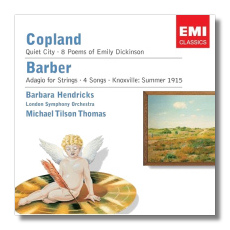
The Internet's Premier Classical Music Source
Related Links
- Latest Reviews
- More Reviews
-
By Composer
-
Collections
DVD & Blu-ray
Books
Concert Reviews
Articles/Interviews
Software
Audio
Search Amazon
Recommended Links
Site News
 CD Review
CD Review
American Originals

- Aaron Copland:
- Quiet City
- 8 Poems of Emily Dickinson
- Samuel Barber:
- Adagio for Strings, Op. 11
- 4 Songs, Op. 13
- #3 Nocturne
- #4 Sure on this shining night
- Knoxville: Summer of 1915
Barbara Hendricks, soprano
London Symphony Orchestra/Michael Tilson Thomas
EMI Encore 345287-2 DDD 63:17
This is a welcome addition to EMI's budget-priced "Encore" series." The original recording dates from 1994, and it has lost nothing of its bloom. Quiet City is not one of Copland's most often recorded scores, but it's a beauty, and it makes a canny bookend with Barber's Knoxville: Summer of 1915, as both ask their existential questions in a tellingly understated manner. Maurice Murphy plays the trumpet solos in Quiet City effectively, and Tilson Thomas shapes the music with sensitivity. In Barber's Knoxville: Summer of 1915, Hendricks is nothing if not communicative, with a simplicity that speaks volumes, and her excellent diction makes up for the fact that EMI has not included texts. Although by 1994 she had been singing professionally for 20 years, Hendricks's is convincingly youthful as she sings James Agee's text. (The voice is in excellent condition too, with the top free and clear.) Even better is the way in which she creates different characters for the Dickinson songs. She makes the sentiments real, avoiding the danger of over-interpreting these songs and making them sound too cute. The two Barber songs make a nice bonus, and Hendricks sings them with depth.
Tilson Thomas's recording of the Adagio for Strings also is a good one. Although he takes a fairly broad tempo (the playing time is 8:41), he resists the temptation to turn the music into a taffy-pull of sticky emotionalism. One could hardly call this a stoic reading, however.
The Abbey Road sound is gorgeous throughout. Although the balance between Hendricks's voice and the London Symphony might not be completely realistic, when the results sound this good, who's to complain?
If you missed this CD the first time around, don't let it pass you by again, even if you already have other recordings of this repertoire.
Copyright © 2006, Raymond Tuttle




















